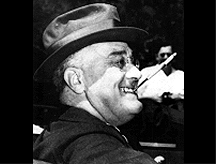
|

|
When Theodore Roosevelt assumed the presidency in 1901, a dynamic new liberalism began to emerge in the United States of American. When another lively Republican, Ronald Reagan, assumed presidency in 1981, American liberalism was waning. This course will survey the history of the United States during those eight decades, with the rise, accomplishments, and decline of liberalism as its organizing theme. Many topics will be considered: transformations in the economy, party politics, the impact of Progressivism, U.S. foreign policies, warfare, women┐s suffrage and feminism, the civil rights movement, the labor movement, student movements, anti-war movements and other, less well-known social movements, the vast expansion of the federal government and increasing power of the executive branch, and shifts in intellectual life and popular culture. Readings will include articles from those decades, music, and broadcasts of speeches as well as historical studies.
COURSE FORMAT: Lecture/Discussion
Level: UGRD Credit: 1 Gen Ed Area Dept: SBS HIST Grading Mode: Student Option
Prerequisites: NONE Links to Web Resources For This Course.
Last Updated on MAR-21-2005
Copyright Wesleyan University, Middletown, Connecticut, 06459